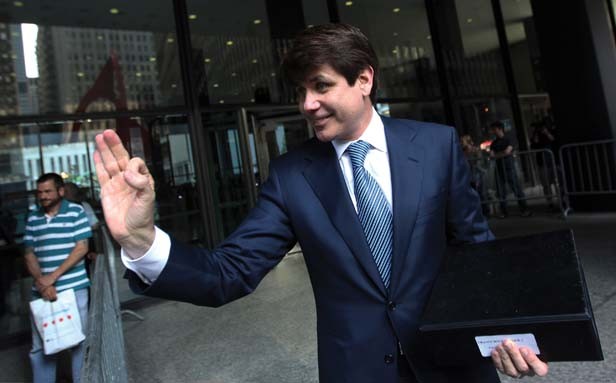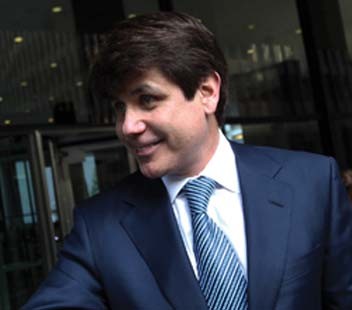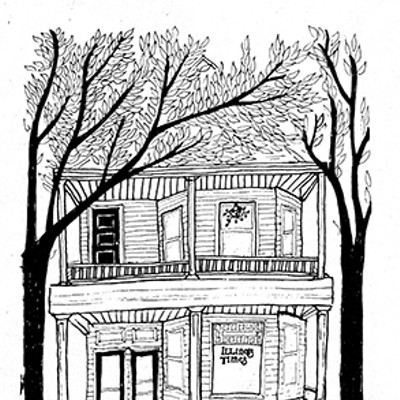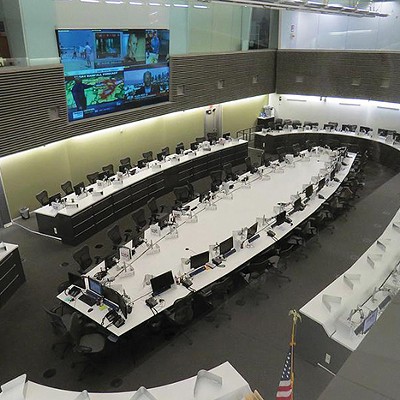
As I write, the jury is still out on Rod Blagojevich. The coming verdict in his second trial for behaving like an Illinois governor will settle for now the question of his criminal culpability. Other questions of perhaps more moment to Illinois are likely to remain unaddressed, much less answered.
Blagojevich was tried a second time because his first trial led to his acquittal on 23 of 24 counts brought against him by federal prosecutors. The vote on the major counts was 11 in favor of conviction. Juror No. 12 is a 67-year-old grandmother and retired state employee, who in post-trial interviews explained that in her judgment Blagojevich did what the feds alleged, but that what he did (or rather what he hoped to do) was not a crime, at least not as life is lived in Illinois. She deemed that his rewarding political allies with state grants to be merely politics – unseemly, but not illegal. As for his frantic attempts to barter votes, money and positions for cash for himself and his wife, the key point was not their grubbiness but that they came to nothing.
Juror No. 12’s case against the government’s arguments hinged on the same point on which the feds based their case. Taking action to further illegal or unethical acts is a crime. But what does “taking action” mean in this context? Former presecutors, interviewed as experts during the first trial, explained to Chicago TV viewers that conspiracy is a crime if there’s evidence that two or more people take action to effect a criminal act, and that doing something as simple as picking up a telephone to bully a subordinate qualifies as such an action.
I cannot agree with some of the more fervent Blago backers, who insisted that the case was a setup. I do wonder whether a law that defines otherwise inconsequential talk as “action” reaches too far. Laws that make mere talking a crime are familiar weapons in government attempts to silence dissidents of all types. They have a long and inglorious history in Illinois, where they have been widely used by government agents to hunt down socialists and trade unionists and “Reds” in the 1880s, during World War I and again during the Cold War.
We don’t hunt Reds in Illinois, at least for the moment. We do hunt politicians. Corruption trials of the sort in which Illinois officeholders have figured so gloriously often have relied on laws that thoughtful Illinoisans might regard as dubious. A good example is the 1988 federal statute that made it a crime to “deprive another of the intangible right of honest services.” It was widely used to punish self-dealing and conflicts of interest by government and corporate officials even, or rather especially, when those officials could not be shown to have received a direct quid pro quo in exchange for their actions. In effect they were charged with having committed what we might call (with apologies to Jimmy Carter) “bribery of the heart.”
Some of the counts brought by the feds against Blago in the first trial relied on this “intangible right” statute. It also was used by the then-unknown Big Jim Thompson to convict the then-federal judge Otto Kerner for having acquired while he was governor shares in a racetrack that was regulated by the State of Illinois. That case was widely damned as a travesty. (The U.S. Supreme Court in 2010 finally dismissed the intangible right statute as unconstitutionally vague.) It ignited the political career of the egregious Mr. Thompson, who was a master of doing bad things legally, at the expense of the reputation of a better man who guilelessly did things that only looked bad but did them illegally.
No, I don’t think the Blagojevich prosecution is politically inspired; after all, it was brought by a Republican appointee. Any bias that exists against Blagojevich in the federal prosecutor’s office is likely to be cultural and aesthetic. However, any kind of bias on the part of law enforcement exposes defendants to arbitrary exercises of power. The jury system evolved in part to provide a corrective to official bias by providing citizens in trouble with the opportunity of a fair trial before independent citizens like Juror No. 12.
To the courts, a fair trial means considering only the facts and the law as explained by the courts. But I suspect a great many Americans agree that the juror’s job at least in part is to be the instrument of fairness in the broader sense – against police prejudice, against politically motivated prosecutors and, yes, sometimes against the laws passed in their name.
Contact James Krohe Jr. at [email protected].




















